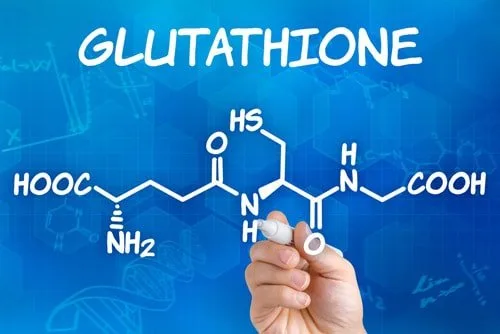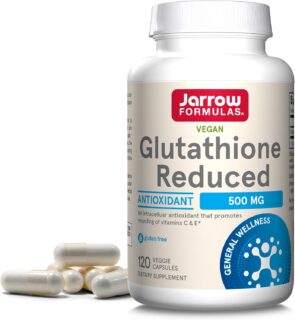We all know that antioxidants are important, and glutathione is one of the most important and potent antioxidants. Produced by the body, glutathione is primarily made up of three amino acids: glutamine, glycine and cysteine and it’s referred to as “the mother of all antioxidants” due to its strong ability to combat oxidative stress and provide a number of health benefits for the body.
The fact is the body needs antioxidants to help you live a long and healthy life as their antioxidant value allows it to protect the body against dangerous free radicals, thus protecting it from breakdown and disease. In fact, a glutathione deficiency increases the risk of oxidative stress, which can then increase the risk of many diseases such as cancer, heart disease, Parkinson’s, as well as Alzheimer’s (1).
What causes glutathione deficiency?
Age is the most common and natural reason for glutathione levels declining. Additional factors also include:
- Chronic stress
- Excessive alcohol use
- Smoking
- Poor diet
- Certain medications
- Chronic disease
- Infections
What are its health benefits?
1. Fights oxidative stress
Being the mother of all antioxidants, glutathione helps to effectively neutralize free radicals, preventing oxidative stress, thus keeping your body healthy.
2. Helps maintain energy production
The mitochondria is the powerhouse of the cells as it’s responsible for converting glucose, amino acids as well as fats into energy that the body will use for various bodily functions. Because it’s so vital to your body, the mitochondria need to be protected, and that’s where glutathione comes in.
A damaged mitochondrion not only leads to decreased bodily function and efficiency, but can also cause an increase in free radicals, which in turn can cause more harm and damage to the body. Luckily, glutathione helps to protect the mitochondria from free radicals and ensure proper energy production.
3. Helps protect skin health
Whatever your skin concerns may be, it appears that glutathione is the answer to them all.
Oxidative stress is one of the main causes of premature aging, yet glutathione can help to fight against this, by encouraging cell regeneration and thus keeping wrinkles and fine lines away. Additionally, in doing this, antioxidants can also help to ward off acne and pigmentation (2).
4. Helps protect brain health
For those worried about the state of their brain as they age, glutathione can help to ease these fears. In fact, glutathione may help to protect the brain against common neurodegenerative diseases such as Parkinson’s and Alzheimer’s disease.
People with Parkinson’s and Alzheimer’s disease have each been found to have low levels of glutathione, which, in turn, has been found to be a potentially effective therapy against neurodegenerative diseases.
According to a study published in the Mayo Clinic proceedings journal, glutathione may have helped reduce symptoms as well as improve the quality of life in people with Parkinson’s.
5. Helps protect heart health
Heart disease continues to be the number one cause of death worldwide, yet it appears that glutathione can help to curb these alarming statistics.
A study published in the Coronary Heart Disease Journal suggests that glutathione can help reduce the risk of heart disease and heart attacks. It does this by not only fighting off free radicals, but also combating the accumulation of plaque in the blood vessels.
6. Helps boost the immune system
While we often applaud vitamin C for the way it protects the immune system, glutathione may be just as helpful.
For one, a study published in PLOS ONE found that antioxidants can help enhance the body’s white blood cells, making them more effective at fighting off bacterial and viral infections.
7. Autism
According to a small clinical trial published in Medical Science Monitor, there is a connection between children with autism spectrum disorders, higher levels of oxidative damage, and lower levels of glutathione in their brain.
The same study suggested that oral supplements and injections may help reduce some effects of autism.
How do I naturally increase my glutathione levels?
1. Eat more sulfur-rich foods
Sulfur is an important mineral that’s needed for the production of glutathione, and it’s found naturally in a few foods.
Sulfur is commonly found in beef, fish, and poultry, but it can also be found in cruciferous vegetables like broccoli, Brussels sprouts, cauliflower, as well as kale.
2. Add selenium to your diet
Selenium is an essential mineral that can help to maintain the body’s level of glutathione.
Selenium can be found in eggs, Brazil nuts, whole grains, asparagus as well as oysters. That said, it’s essential to eat no more than 400 mg per day of selenium, as doing so can be potentially toxic.
3. Supplement With Whey Protein
As mentioned, glutathione is made up of amino acids, and one of them is the amino acid cysteine.
Cysteine is found in whey protein, and whey protein has been found to increase levels of glutathione (3).
4. Get Enough Sleep
Getting enough quality sleep is important for our overall health, and not doing so can affect our immune system and even decrease glutathione levels.
In fact, a study published in the Progress in Neuro-Psychopharmacology and Biological Psychiatry journal found that glutathione activity was significantly lower in participants with insomnia.
What about supplements?
Food sources and lifestyle habits aren’t the only way to increase your glutathione levels. In fact, glutathione is also available as an oral supplement in a capsule as well as in liquid form.
However, some researchers have shared concerns about the effectiveness of orally consumed antioxidants.
Are there any side effects?
Due to a lack of research, the side effects of using glutathione supplements are not widely known. However, the use of glutathione supplements may cause cramping, bloating, gas, as well as possible allergic reactions.
Before taking a dietary supplement, it’s important to always consult your healthcare provider.
The bottom line
Glutathione is a powerful antioxidant that’s made in the body’s cells and that’s needed to ensure that you live a long and healthy life. Despite its levels decreasing with age due to age or environmental factors, you can still maintain healthy glutathione levels and keep you and your family healthy.




![women [longevity live]](https://longevitylive.com/wp-content/uploads/2020/01/photo-of-women-walking-down-the-street-1116984-100x100.jpg)










